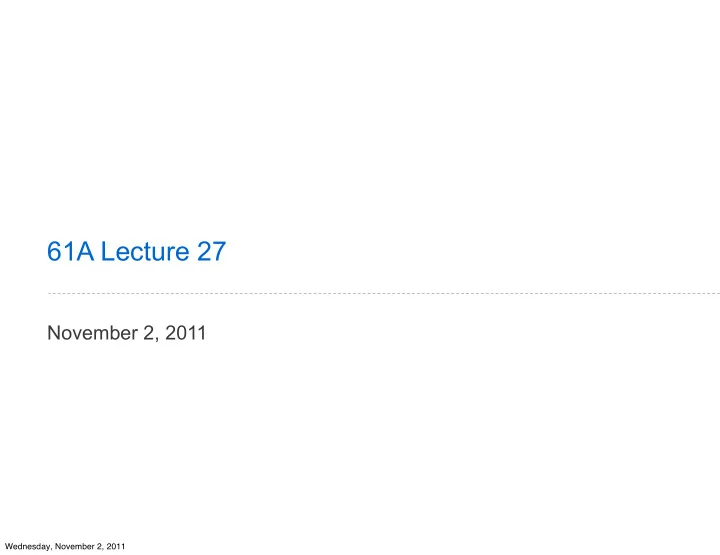

61A Lecture 27 November 2, 2011 Wednesday, November 2, 2011
Parsing A Parser takes as input a string that contains an expression and returns an expression tree expression parser Evaluator string value tree 'add(2, 2)' Exp ('add', [2, 2]) 4 Eval Lexical analysis Apply Evaluate Apply a function Syntactic operands to its arguments analysis 2 Wednesday, November 2, 2011
Two-Stage Parsing Lexical analyzer: Analyzes an input string as a sequence of tokens, which are symbols and delimiters Syntactic analyzer: Analyzes a sequence of tokens as an expression tree, which typically includes call expressions def calc_parse(line): """Parse a line of calculator input.""" tokens = tokenize(line) Lexical analysis is also called expression_tree = analyze(tokens) tokenization 3 Wednesday, November 2, 2011
Parsing with Local State Lexical analyzer: Creates a list of tokens Syntactic analyzer: Consumes a list of tokens def calc_parse(line): """Parse a line of calculator input.""" tokens = tokenize(line) Lexical analysis is also called expression_tree = analyze(tokens) tokenization if len(tokens) > 0: raise SyntaxError('Extra token(s)') return expression_tree 4 Wednesday, November 2, 2011
Lexical Analysis (a.k.a., Tokenization) Lexical analysis identifies symbols and delimiters in a string Symbol: A sequence of characters with meaning, representing a name (a.k.a., identifier), literal value, or reserved word Delimiter: A sequence of characters that serves to define the syntactic structure of an expression >>> tokenize('add(2, mul(4, 6))') ['add', '(', '2', ',', 'mul', '(', '4', ',', '6', ')', ')'] Symbol: a built-in Symbol: a Delimiter Delimiter operator name literal (When viewed as a list of Calculator tokens) 5 Wednesday, November 2, 2011
Lexical Analysis By Inserting Spaces Most lexical analyzers will explicitly inspect each character of the input string For the syntax of Calculator, injecting white space suffices def tokenize(line): """Convert a string into a list of tokens.""" spaced = line.replace('(',' ( '). spaced = spaced.replace(')', ' ) ') spaced = spaced.replace(',', ' , ') return spaced.strip().split() Discard preceding or Return a list of strings following white space separated by white space 6 Wednesday, November 2, 2011
Syntactic Analysis Syntactic analysis identifies the hierarchical structure of an expression, which may be nested Each call to analyze consumes input tokens for an expression >>> tokens = tokenize('add(2, mul(4, 6))') >>> tokens ['add','(','2',',','mul','(','4',',','6',')',')'] >>> analyze(tokens) Exp('add', [2, Exp('mul', [4, 6])]) >>> tokens [] 7 Wednesday, November 2, 2011
Recursive Syntactic Analysis A predictive recursive descent parser inspects only k tokens to decide how to proceed, for some fixed k. Can English be parsed via predictive recursive descent? sentence subject The horse raced past the barn fell. ridden ( t h a t w a You got s ) Gardenpath'd ! 8 Wednesday, November 2, 2011
Recursive Syntactic Analysis A predictive recursive descent parser inspects only k tokens to decide how to proceed, for some fixed k. Coerces numeric symbols to numeric values def analyze(tokens): token = analyze_token(tokens.pop(0)) In Calculator, we inspect 1 token if type(token) in (int, float): return token Numbers are complete expressions else: tokens.pop(0) # Remove ( return Exp(token, analyze_operands(tokens)) tokens no longer includes first two elements 9 Wednesday, November 2, 2011
Mutual Recursion in Analyze ['add','(','2',',','3',')'] def analyze(tokens): ['(','2',',','3',')'] token = analyze_token(tokens.pop(0)) if type(token) in (int, float): return token else: tokens.pop(0) # Remove ( ['2',',','3',')'] return Exp(token, analyze_operands(tokens)) ['2',',','3',')'] def analyze_operands(tokens): operands = [] while tokens[0] != ')': Pass 1 Pass 2 if operands: tokens.pop(0) # Remove , ['3',')'] operands.append(analyze(tokens)) [',','3',')'] [')'] tokens.pop(0) # Remove ) [] return operands 10 Wednesday, November 2, 2011
Token Coercion Parsers typically identify the form of each expression, so that eval can dispatch on that form In Calculator, the form is determined by the expression type • Primitive expressions are int or float values • Call expressions are Exp instances def analyze_token(token): try: What would change if return int(token) we deleted this? except (TypeError, ValueError): try: return float(token) except (TypeError, ValueError): return token 11 Wednesday, November 2, 2011
Error Handling: Analyze known_operators = ['add', 'sub', 'mul', 'div', '+', '-', '*', '/'] def analyze(tokens): assert_non_empty(tokens) token = analyze_token(tokens.pop(0)) if type(token) in (int, float): return token if token in known_operators: if len(tokens) == 0 or tokens.pop(0) != '(': raise SyntaxError('expected ( after ' + token) return Exp(token, analyze_operands(tokens)) else: raise SyntaxError('unexpected ' + token) 12 Wednesday, November 2, 2011
Error Handling: Analyze Operands def analyze_operands(tokens): assert_non_empty(tokens) operands = [] while tokens[0] != ')': if operands and tokens.pop(0) != ',': raise SyntaxError('expected ,') operands.append(analyze(tokens)) assert_non_empty(tokens) tokens.pop(0) # Remove ) return elements def assert_non_empty(tokens): """Raise an exception if tokens is empty.""" if len(tokens) == 0: raise SyntaxError('unexpected end of line') 13 Wednesday, November 2, 2011
Let's Break the Calculator I delete a statement that raises an exception You find an input that will crash Calculator 14 Wednesday, November 2, 2011
Recommend
More recommend